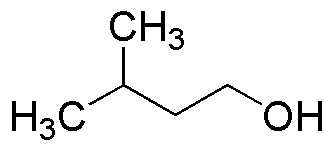Isoamyl alcohol is widely utilized in research focused on:
- Flavoring and Fragrance Industry: This compound is commonly used as a flavoring agent in food products and beverages, providing a pleasant banana-like aroma. Its natural occurrence in various fruits makes it a popular choice for enhancing flavors.
- Solvent Applications: Isoamyl alcohol serves as an effective solvent in chemical reactions and extractions, particularly in the synthesis of pharmaceuticals and agrochemicals. Its ability to dissolve a wide range of substances makes it invaluable in laboratory settings.
- Biochemical Research: In biochemistry, it is used to extract proteins and other biomolecules due to its ability to disrupt cellular membranes. This property is crucial for researchers studying cell biology and protein interactions.
- Cosmetic Formulations: The compound is incorporated into cosmetic products for its skin-conditioning properties and pleasant scent. It enhances the sensory experience of lotions and creams, making them more appealing to consumers.
- Industrial Applications: Isoamyl alcohol is used in the production of various chemicals, including esters and plasticizers. Its role in manufacturing processes contributes to the creation of materials with desirable properties, such as flexibility and durability.
General Information
Properties
Safety and Regulations
Applications
Isoamyl alcohol is widely utilized in research focused on:
- Flavoring and Fragrance Industry: This compound is commonly used as a flavoring agent in food products and beverages, providing a pleasant banana-like aroma. Its natural occurrence in various fruits makes it a popular choice for enhancing flavors.
- Solvent Applications: Isoamyl alcohol serves as an effective solvent in chemical reactions and extractions, particularly in the synthesis of pharmaceuticals and agrochemicals. Its ability to dissolve a wide range of substances makes it invaluable in laboratory settings.
- Biochemical Research: In biochemistry, it is used to extract proteins and other biomolecules due to its ability to disrupt cellular membranes. This property is crucial for researchers studying cell biology and protein interactions.
- Cosmetic Formulations: The compound is incorporated into cosmetic products for its skin-conditioning properties and pleasant scent. It enhances the sensory experience of lotions and creams, making them more appealing to consumers.
- Industrial Applications: Isoamyl alcohol is used in the production of various chemicals, including esters and plasticizers. Its role in manufacturing processes contributes to the creation of materials with desirable properties, such as flexibility and durability.
Documents
Safety Data Sheets (SDS)
The SDS provides comprehensive safety information on handling, storage, and disposal of the product.
Product Specification (PS)
The PS provides a comprehensive breakdown of the product’s properties, including chemical composition, physical state, purity, and storage requirements. It also details acceptable quality ranges and the product's intended applications.
Certificates of Analysis (COA)
Search for Certificates of Analysis (COA) by entering the products Lot Number. Lot and Batch Numbers can be found on a product’s label following the words ‘Lot’ or ‘Batch’.
*Catalog Number
*Lot Number
Certificates Of Origin (COO)
This COO confirms the country where the product was manufactured, and also details the materials and components used in it and whether it is derived from natural, synthetic, or other specific sources. This certificate may be required for customs, trade, and regulatory compliance.
*Catalog Number
*Lot Number
Safety Data Sheets (SDS)
The SDS provides comprehensive safety information on handling, storage, and disposal of the product.
DownloadProduct Specification (PS)
The PS provides a comprehensive breakdown of the product’s properties, including chemical composition, physical state, purity, and storage requirements. It also details acceptable quality ranges and the product's intended applications.
DownloadCertificates of Analysis (COA)
Search for Certificates of Analysis (COA) by entering the products Lot Number. Lot and Batch Numbers can be found on a product’s label following the words ‘Lot’ or ‘Batch’.
*Catalog Number
*Lot Number
Certificates Of Origin (COO)
This COO confirms the country where the product was manufactured, and also details the materials and components used in it and whether it is derived from natural, synthetic, or other specific sources. This certificate may be required for customs, trade, and regulatory compliance.


